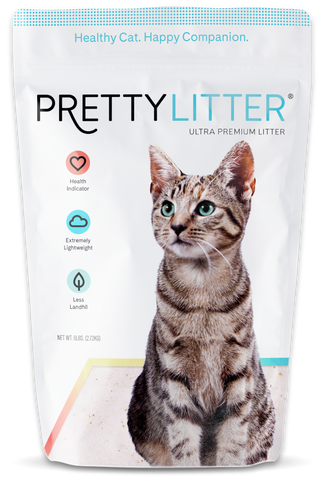November 5, 2018 |5 min read
Cats and Catnip: Why Does Your Cat Go Crazy For This?

Written by

Catnip is a very special plant to many cats. While it comes from a perennial herb in the mint family, to cats it is like the equivalent of a hallucinogenic , and no, we have no idea how this was gauged. Here is all you need to know about cats and catnip.
What is Catnip?

As mentioned, catnip is an herb that comes from the mint family. There is a chemical compound found in the stems and leaves called nepetalactone, which acts as a stimulant.
The blooms on the stems of catnip are a gorgeous lavender, white, blue, or pink - but that's not what your kitty is after.
Many people grown their own catnip and it's fairly easy to do. Use the seedling or seeds and plant after the last freeze of the season. They like full sunlight and soil that is porous. Give them plenty of room to grow, hang the cuttings in a cool, dark place (upside down), and store the dried leaves for future use.


Cat Litter That Prioritizes Their
Health & Your Happiness.
to get your first bag for only $14.99
How Does It Work?
Only about half of cats are susceptible to the euphoria caused by catnip. It is considered to be similar to how we react to hallucinogens. The difference in catnip and some hallucinogenic drugs in humans is that catnip is not harmful at all.
The effects last about 15 minutes, which could cause susceptible kitties to pawn their belongings to get more. But seriously, catnip is actually non-addictive. Your cat may (or may not) love the feeling it gets from a bit of catnip.
According to Healthy Pet:
Catnip makes some cats aggressive rather than happily euphoric or pleasantly relaxed. If you have a multi-cat household, I recommend you introduce catnip to each cat individually to avoid any potential for fighting.
If the catnip is ingested, it simply causes fatigue and works as a sedative. For cats that sniff catnip and rub against the plants - those are the ones who get the stimulating effects.
Why Do Some Cats React and Some Do Not?

About 50 percent of cats seem to be affected by catnip, and the behavior that results varies widely between individuals, and it is believed to be an inherited sensitivity.
Other statistics state up to 75 percent are affected but basically, it's a decently large number - at least half.
If you do have a cat that has inherited this passion for the plant, it doesn't show up immediately. Instead, it will take quite a few months since young kittens are not affected.
One of the interesting aspects is that long-term exposure renders the effects...well, non-effective. The euphoria that your cat gets from catnip does wear off the more they use it.

Catnip for Human Consumption?
It's true. Humans have used catnip for centuries - mostly for its sedative effects when brewed in a tea or infusion. It helps with nausea, toothaches, and headaches although pregnant women should stay away from the nip. Some health food stores even sell capsules that are used to treat digestive issues and headaches.
Other uses for humans include wound care by crushing the catnip leaves, wetting them, and making a paste for the wound.
Do you have a cat that loves catnip or does your cat totally ignore it? Let us know in the comments.
----
Don't forget to follow us on Instagram: @prettylittercats
----
Delivered straight to your front door, every month. We’ll even pay your shipping.








